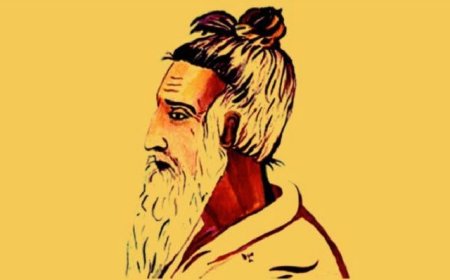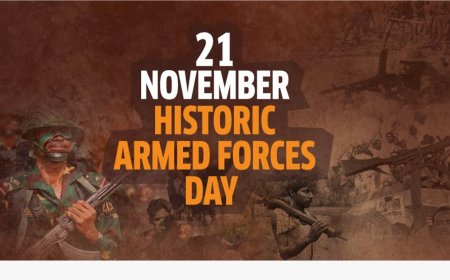BNP and NCP: Refusing to Acknowledge Their Own Image in the Mirror
BNP and NCP: Refusing to Acknowledge Their Own Image in the Mirror

A few months ago, there was a regular exchange of verbal barbs between BNP and Jamaat leaders. While political rhetoric is certainly preferable to violence, such discourse must be conducted within the boundaries of civility and respect. In recent times, however, the confrontation has intensified between BNP and the National Citizen Party (NCP), with leaders from both sides engaging in near-daily allegations and counter-allegations. These accusations are often made without verification, almost serving as an indirect acceptance of their opponents' criticisms.
On 3 April, during an event organised by the Ziaur Rahman Foundation in Begumganj, Noakhali, BNP Vice Chairman Barkatullah Bulu made strong remarks regarding certain government advisors. He claimed that some individuals who were once student leaders now travel in convoys worth crores of taka, using government vehicles. While such use of official cars may not technically be wrong, Bulu suggested this demonstrates a lack of fiscal responsibility. He assured that if BNP returns to power, its leaders would travel in modest vehicles, in contrast to the current practice where ministers, advisors, and senior officials use expensive cars funded by taxpayers.
Bulu also accused NCP leaders of interfering with administrative functions, such as transfers and postings, and pressuring engineers to award contracts to preferred individuals. He stated that secretaries and officials themselves admitted being under such pressure. However, Bulu's own party has reportedly engaged in similar practices, as have other political parties like Jamaat-e-Islami, with BNP allegedly taking the lead in such influence-driven activities. Additionally, Bulu criticised Jamaat for its stance on the 1971 Liberation War, stating that those who deny the country’s history and sacrifices have no moral ground to participate in Bangladesh’s political processes.
The previous day, NCP had issued a statement accusing BNP of contributing to political unrest despite efforts to expel disruptive members. They expressed concern over internal BNP clashes that have resulted in injuries to members of other parties, including Azizur Rahman, father of NCP’s central joint convener Mahbub Alam. He sustained serious injuries during a clash in Lakkhipur on 30 March. NCP also alleged that their organisers are facing threats from BNP activists across the country. A study conducted by NCP, published on its verified Facebook page under the title “New Bangladesh, Old BNP,” claimed that 70 individuals were killed in internal BNP clashes over the past eight months. This list, based on newspaper reports between 7 August and 31 March, categorised incidents under financial and verbal abuse, physical violence, and death.
Ariful Islam Adeeb, NCP’s senior joint convener, highlighted that while 22–27 BNP members died during the one-point anti-government movement from October 2023 to January 2024, the internal violence over the past eight months resulted in even more casualties, despite the absence of confrontation with the state. On 24 March, NCP leader Hannan Masud was allegedly attacked by BNP members in Hatiya, reportedly due to his rising popularity. This incident was followed by a press briefing by his supporters. Furthermore, Sarjis Alam, NCP’s northern organiser, drew criticism for conducting an election campaign with over 100 vehicles. While BNP leaders condemned this display, the matter was also questioned internally within NCP, and Alam publicly responded—suggesting some degree of intra-party democracy, which is often absent in parties like BNP and the Awami League.
Bulu’s sharp response is perceived as a reaction to NCP's recent study and aggressive posture. These verbal confrontations are largely driven by electoral calculations. NCP claims that BNP is not interested in meaningful reforms and is hastening the election process, yet its own leaders have begun visiting constituencies, especially during Eid. BNP, too, is staying in touch with its grassroots, and in the absence of the Awami League from the political race, BNP sees NCP and Jamaat as key rivals. There is concern within BNP that a potential electoral alliance between NCP and Jamaat could disrupt its vote bank.
Although NCP has declared its intention to establish a “new Bangladesh” and a fresh political culture, some of its leaders continue to adopt the same confrontational tone. For instance, at a rally in Cumilla’s Lalmai upazila, NCP’s joint member secretary Zainul Abedin said that wherever there is an Awami League presence in Cumilla, there will be a mass “cleansing.” Such statements contradict NCP's stated commitment to change. While political parties remain focused on discrediting their rivals, they often fail to reflect on their own shortcomings. Instead of solely targeting BNP, NCP would do better to finalise its constitution and present its policies clearly. The fact that even a month after its launch, NCP has yet to release its party constitution or slogan raises questions about its readiness to lead and its credibility among the public.
What's Your Reaction?




















































































